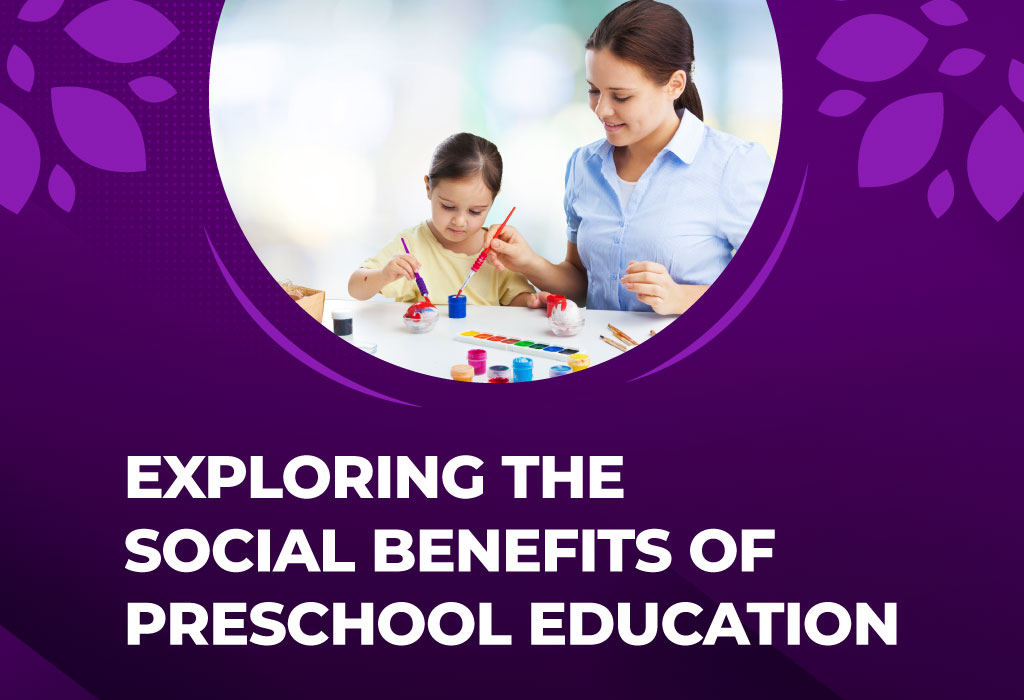Exploring the Social Benefits of Preschool Education

Early childhood education created for kids usually between the ages of 2.5 and 3.5 years is referred to as preschool education. These programs offer an organized environment where kids can participate in a range of activities that support their social, emotional, physical, and cognitive growth. Preschool education also emphasizes the development of social skills, which are essential for success in school and beyond, even though intellectual preparation is an important factor. For parents seeking a nurturing and structured environment for their little ones, the Play School in Vedapatti provides an excellent foundation for early childhood development.
Preschool education is important for children’s development because it is frequently their first formal educational experience. While its major goal is to prepare children for primary school, it also has significant social benefits that are often underestimated. We explore the several ways that preschool education fosters a child’s social development and prepares them for interactions with society in the future in this blog.
Social Benefits of Preschool Education
Enhanced Social Interaction Skills: Giving kids the chance to connect with classmates and adults in a controlled environment is one of the main social benefits of preschool education. Playtime, cooperative projects, and group activities teach kids important social skills including sharing, taking turns, and peacefully resolving disagreements.
Development of Communication Skills:
Children learn to communicate verbally in preschool settings, which aids in their language development and helps them successfully express their emotions and thoughts. Teachers create a safe space where kids feel free to express themselves by leading group discussions, storytelling, and chats.
Diversity & Cultural Awareness: It is crucial to expose children to diversity at a young age in today’s heterogeneous culture. Preschools encourage children’s cultural acceptance and awareness by regularly celebrating international holidays, customs, and festivals. Later in life, tolerance, respect, and an appreciation of differences are all made possible by this experience.
Collaboration & Teamwork: A lot of preschool activities are made to encourage children to work together as a team. Children learn the concept of cooperation and teamwork via activities like putting on a class play or building structures out of blocks. Through these experiences, they learn to value the contributions of others and collaborate to achieve shared objectives, which is a necessary ability for success in any social situation.
Empathy and emotional intelligence: Children have many possibilities to grow in these areas during their preschool years. In order to help students empathize with others and respond with love and compassion, teachers assist students in identifying and labeling their feelings. Children develop the foundation for healthy social interactions by learning to comprehend and accept the emotions of their peers through role-playing, storytelling, and conversations about feelings.
Conflict Resolution Skills: Since conflict naturally arises in social interactions, preschools offer a secure setting in which kids can learn how to settle disputes amicably. Instructors assist students in negotiating solutions to interpersonal issues by serving as role models for successful conflict resolution techniques. Children acquire vital conflict resolution skills through active listening, aggressive communication, and compromise-seeking that benefit them throughout their lives.
Self-Regulation and Behavior Management: A vital component of social development, preschool education teaches kids how to control their emotions, impulses, and conduct. Children can learn to control their behavior and exercise self-control in a variety of social contexts by being exposed to regular routines, explicit expectations, and positive reinforcement. These abilities build the groundwork for future academic performance and healthy interpersonal interactions in addition to fostering a peaceful learning environment in the classroom.
Peer Acceptance and Friendship Development: Preschools give kids the chance to make friends and create social ties with their classmates. Children learn to negotiate social dynamics, form friendships, and find a feeling of belonging in their peer group through playtime, shared experiences, and cooperative activities. Healthy social development requires a sense of comfort and confidence, which are fostered by these early friendships.
Preparation for School and Beyond: Preschool education establishes the foundation for future academic and social achievement in addition to the immediate social benefits. Preschools assist children in developing the abilities, dispositions, and behaviors required for a seamless transition to elementary school and beyond by offering a nurturing and engaging environment. Preschoolers’ social skills serve as the foundation for lifetime learning, social integration, and positive citizenship.
Preschool education has several social advantages that are essential to a child’s whole growth. Preschools have a critical role in shaping children’s social competence and readiness for school and beyond, from improved social interaction skills to the development of empathy, teamwork, and dispute-resolution abilities. For those in the area, a Pre School in Vedapatti provides an excellent environment for these developmental milestones. Preschool education lays the groundwork for a lifetime of healthy social interactions and significant participation in society by offering a caring atmosphere where kids can learn, develop, and thrive socially.

